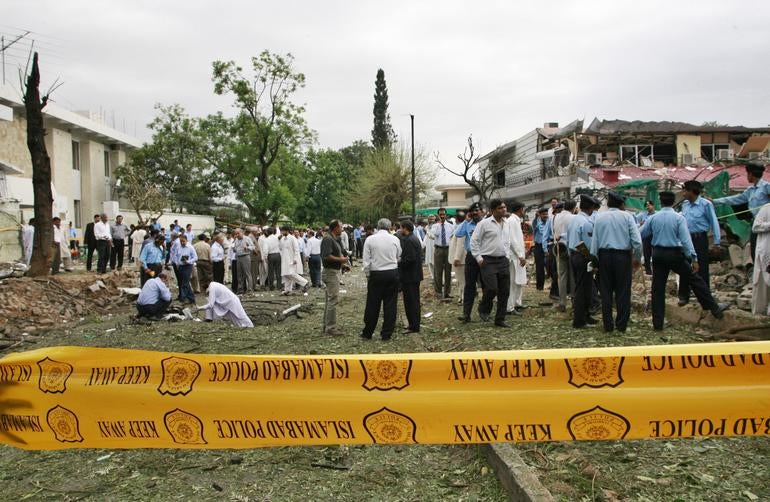
A car bomb that killed at least six people at the Danish embassy in Islamabad on Monday is thought to be in retribution for the publishing of cartoons of the Muslim prophet Muhammad in a Danish newspaper.
At least 35 people were hurt as the bomb ripped through the embassy and its neighbouring building in a wealthy district of the Pakistani capital at 1.15am, local time.
Danish foreign minister Per Stig Moeller said yesterday in a television interview that the attack could be linked to recent calls by Al Qaeda deputy Ayman Al Zawahiri for attacks on Danish targets in revenge for the publication of the images of Muhammad.
Danish paper Jyllands-Posten first published a series of caricatures of Muhammad in late 2005 which led to worldwide protests and diplomatic disputes the following year.
Hours before the blast, at the World Editors Forum in Gothenberg on Sunday, three editors defended their reasons for reprinting the cartoons in their publications.
Philippe Val, publisher and editor of French satirical magazine Charlie Hebdo, said he reprinted the infamous cartoons as part of a campaign of solidarity with Jyllands-Posten which saw French daily La Republique and Spanish paper El Pais and others do the same.
No UK national or regional paper published the cartoons, although there were protests outside the Danish embassy in London.
Val said he received threats on his life but remained adamant that while the press should not wilfully offend any minority, its right to offend if necessary should be defended.
He paid tribute to the Danish editor who originally published the cartoons and said he decided to also publish them “because I thought it was terrible for the editor to be fired for such a reason”.
He said: “In a democratic republic [France] it was wrong to be subject to such religious pressure.
“We published them not because they criticised Islam but because they criticise those who claim to be Muslims and commit terrorist acts.”
Also on the panel was Ulf Johansson, editor-in-chief of Swedish regional paper Nerike Allehande who republished the cartoons after a local art exhibition refused to show the original images.
Johansson received death threats from someone claiming to be from Al Qaeda and was given police protection.
Allehande was not the first Swedish paper to publish the images – many did in the wake of the 2005 controversy – but it sparked a bigger outpouring of anger than others, expressed by weeks of angry protests outside its office.
Johansson said: “I do not mean that [offence] should be the goal itself. It must be at the right time and in the right context and legal to do so.
“In our newspaper we defend freedom of religion and at the same time freedom of speech. Often the two go hand in hand.
“Al Qaeda had a price on my head and my family’s head, which is a rather a high price for it. I don’t know if we would ever publish such a cartoon again but I would argue that it should be a possibility legally.”
Also on the panel was the former editor of Jordanian newspaper Shihane, Jehad Momani, who faces blasphemy charges over his reprinting of the cartoons, for which death is the maximum penalty in his country.
Momani said he printed the cartoons in the wake of a Jordanian terror attack to show that Muslims should be more outraged by such violence carried out in their name, instead of the images.
But he questioned the motives of European papers in reprinting them and accused their editors of causing a “clash of cultures”.
He said: “This is what we call fairness – the most important thing is to keep journalism objective. Otherwise, offensive campaigns will affect our efforts to build bridges between our civilisations.”
He criticised news agency Agence France-Presse for, he claimed, falsely reporting that his paper was the first in Jordan to print the cartoons. He said three dailies and two weeklies had published them previously.
Momani also alleged that AFP reported, against his wishes, the threat on his life from Muslim extremists
Email pged@pressgazette.co.uk to point out mistakes, provide story tips or send in a letter for publication on our "Letters Page" blog

